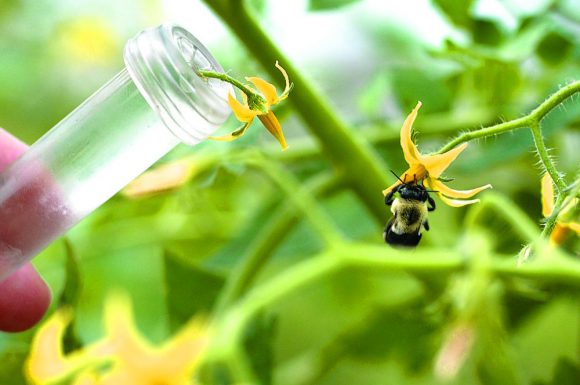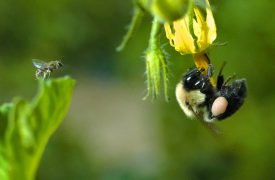
Pollinator study data collection.
Research is helping to develop protocols for pollinator conservation and restoration.
The lab of Rachael Winfree, associate professor in the Department of Ecology, Evolution, and Natural Resources, focuses its research on bees and pollination, including the pollination of crops, and in communicating those scientific results to the agricultural community.
Her lab has focused its outreach efforts on two areas related to sustainable crop pollination. First is developing science-based protocols for pollinator restoration on private lands, an effort funded through several federal Farm Bill programs. Winfree and colleagues are testing the efficacy of different pollinator restoration protocols, in collaboration with New Jersey Natural Resource Conservation Service and the Xerces Society for Invertebrate Conservation.
In addition, her lab is helping to facilitate the integration of native pollinators into crop pollination programs. Native bees can contribute significantly to crop pollination—an important benefit to agriculture given ongoing health problems with managed honey bees (Apis mellifera). The goal is to identify the landscape- and farm-scale factors that determine the crop pollination services provided by native pollinators and to communicate these results to agricultural growers.
Recent high-profile publications of research conducted by the Winfree lab include a 2015 study published in Ecology Letters, the top-ranked journal in the field of ecology. The results of the study showed that the wild, native bees that pollinate watermelon, cranberry and blueberry crops in New Jersey are dominated by a small number of highly effective species, despite the fact that almost 100 different native bee species have been found pollinating these crops in our region.
A second prominent paper, published in Nature Communications, reported a similar finding using data from over 40 studies representing all continents, except Antarctica. The results from this study also showed that crop pollination by wild bees (non-honey bees) is worth $3,251 per hectare, per year on average, which is on par with the economic value of pollination provided by honey bees ($2,913).
 Data on habitat use by pollinators, plant-pollinator relationships and the functional importance of particular pollinator species have also been used by Winfree to develop recommendations for state and federal agencies that implement pollinator conservation and restoration projects. A current project is determining whether both rare bee species and species that provide ecosystem services to crops can be restored via the same habitat restoration protocols.
Data on habitat use by pollinators, plant-pollinator relationships and the functional importance of particular pollinator species have also been used by Winfree to develop recommendations for state and federal agencies that implement pollinator conservation and restoration projects. A current project is determining whether both rare bee species and species that provide ecosystem services to crops can be restored via the same habitat restoration protocols.
Another current project of the Winfree lab is collaborating with the New Jersey Department of Environmental Protection to develop what will be the first comprehensive statewide list of rare bee species for any state in the U.S. This work is funded by a $75,000 grant from the U.S. Fish and Wildlife Service.
Editor’s Note: This story originally appeared in the New Jersey Agricultural Experiment Station 2015 Annual Report.

